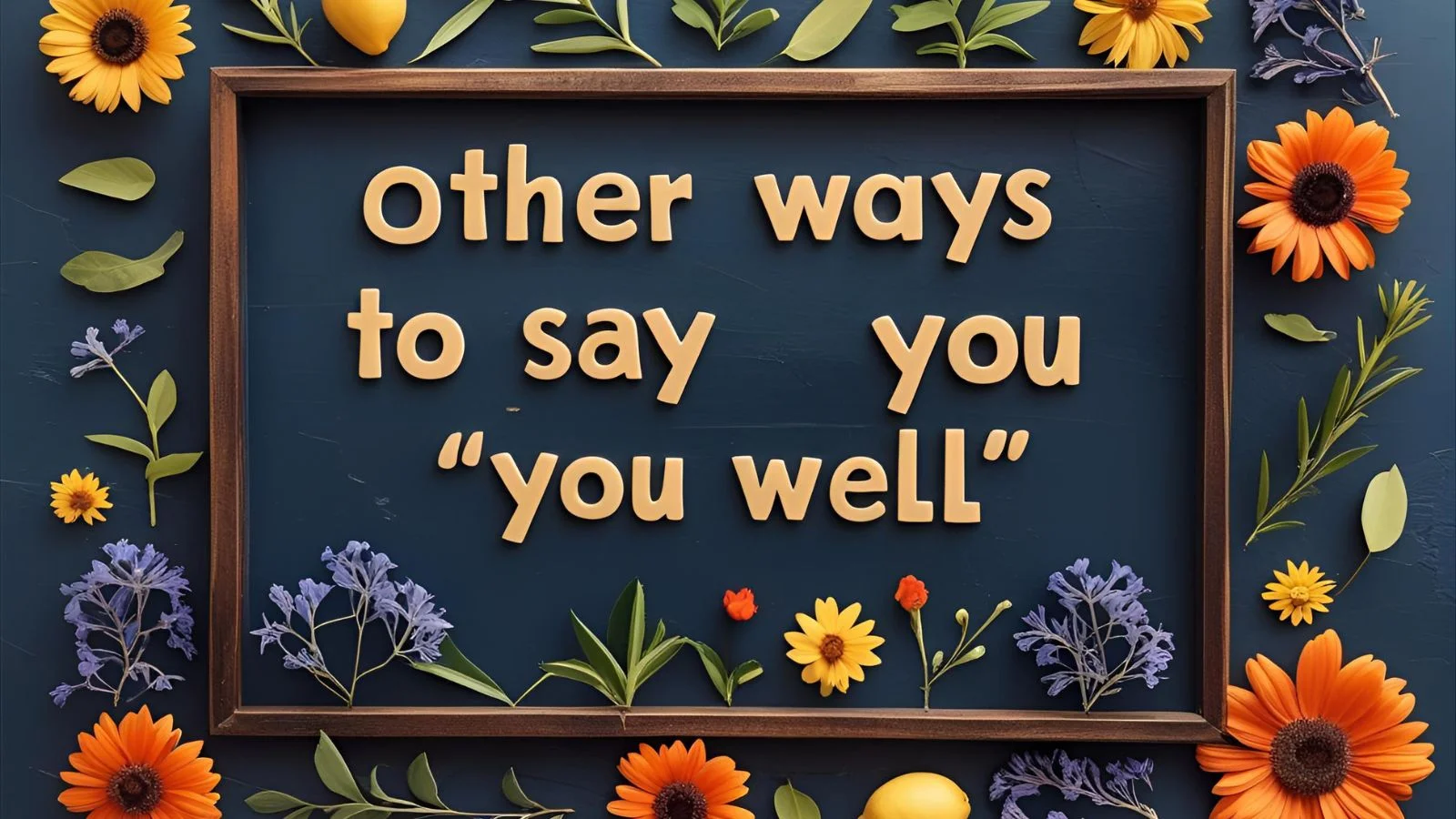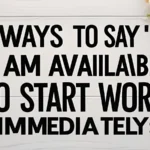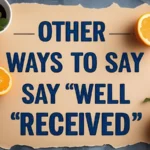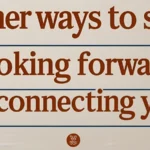In conversations, “You as well” is a common expression used to reciprocate good wishes, sentiments, or polite phrases. However, the phrase can become repetitive when used frequently, and sometimes it’s refreshing to spice up conversations with other alternatives. Whether you are wishing someone well or returning a compliment, there are many creative ways to say “You as well.” Other Ways to Say “You As Well”.
This article will explore different expressions you can use in place of “You as well,” giving you variety and flexibility in communication. You’ll learn various options that can suit different situations, from casual to formal contexts, making your conversations more engaging and colorful. So, let’s dive into these alternative expressions and add more flair to your language.
Return the Favor
“Return the favor” is a great alternative to “You as well” when someone does something nice for you and you want to acknowledge it with the intention of doing the same. It expresses gratitude and indicates that you’d be willing to reciprocate. For example, after someone compliments your outfit, you could say, “Thanks! I’ll return the favor when I see you next!”
This expression conveys a sense of mutual kindness, creating a more meaningful exchange. It’s especially useful in casual settings where you have an established rapport with the person. This phrase not only acknowledges the kindness but also sets the stage for a balanced relationship. It’s a warm and inviting way to express appreciation.
Read More: Other Ways to Say “Well Received”
Likewise
“Likewise” is a short and effective alternative to “You as well.” It’s commonly used to express the same sentiment or action in return, such as responding to a compliment or a well-wish. It’s a simple yet powerful word, conveying mutuality without sounding overly formal. For instance, if someone says, “I hope you have a great day!” you can reply with, “Likewise!” This works in various situations, from casual chats to more formal conversations.
The word keeps things brief while still delivering the same positive intention as “You as well.” It’s especially perfect for quick exchanges or when you want to sound polite but not overly wordy. You can easily integrate it into your daily conversations.
Same to You
“Same to you” is another casual yet effective way to return a kind sentiment or wish. It’s commonly used when responding to well-wishes, compliments, or even casual greetings. For instance, if someone says, “Enjoy your weekend!” you could respond with, “Same to you!”
This response is simple, direct, and universally understood. “Same to you” is versatile and can be used in a variety of social settings, from informal to semi-formal conversations. It’s a quick and easy alternative to “You as well,” offering a touch of warmth and friendliness without being too formal or stiff. This makes it a great option for friendly exchanges or familiar interactions.
Wishing You the Same
“Wishing you the same” is a slightly more formal and detailed alternative to “You as well.” This expression is ideal when you want to emphasize your well-wishes for someone while keeping the tone friendly and respectful. It works great in both professional and casual settings. For example, if someone says, “I hope your meeting goes well today,” you could reply, “Wishing you the same.”
It’s a more thoughtful way to express reciprocity, especially when the context requires a touch of formality or respect. This phrase is often used to acknowledge someone’s kind words and offer the same kindness in return, with a little more emphasis than the usual “You as well.”
Same Here
“Same here” is another great and straightforward option to use in place of “You as well.” It’s a simple response that works when someone shares a positive sentiment or wish. For example, if someone says, “I hope you have a fantastic trip!” you can respond with, “Same here!” This expression is especially fitting in casual, friendly conversations and gives a relaxed vibe to your communication.
“Same here” is perfect for informal contexts, where brevity and ease of conversation are important. It doesn’t come across as too formal or overly casual, striking the perfect balance for a wide range of exchanges. It keeps things light-hearted and friendly.
Cheers to You
“Cheers to you” can be a fun, slightly more creative way to say “You as well,” especially in more casual settings or when celebrating. This expression works well in social situations like toasts or when sharing congratulations. It implies that you’re offering the same positive wishes or congratulations back to someone, but with a celebratory tone. For instance, if someone says, “Good luck with your presentation,” you can reply with, “Cheers to you!” It’s a great way to add enthusiasm and energy to the exchange. While it may not be appropriate for all contexts, it’s an excellent alternative when you want to sound upbeat and festive.
All the Best to You
“All the best to you” is a more formal and heartfelt way to reciprocate well-wishes. It conveys warmth and a sincere desire for the other person’s success or happiness. If someone says, “Good luck with your project!” responding with “All the best to you” shows a deeper level of care and consideration. This alternative is ideal in professional environments or when you want to sound more polished and thoughtful. It expresses a strong, genuine sentiment, ensuring that your good wishes are reciprocated with equal sincerity. This phrase is especially fitting for situations involving professional relationships, formal settings, or special occasions.
Have a Good One
“Have a good one” is a relaxed and friendly alternative to “You as well,” often used in casual exchanges. It’s a go-to response when someone wishes you well or bids you goodbye. For instance, if someone says, “Enjoy your day,” you can reply, “Have a good one!” This phrase works best in informal settings and among people you have a casual relationship with.
It’s simple, quick, and communicates the same good intentions without any formality. Whether you’re leaving work, saying goodbye to a friend, or just wrapping up a conversation, “Have a good one” is an easy way to wish someone well in a light-hearted way.
Hope You Do Too
“Hope you do too” is a casual and engaging response, often used when someone shares a positive wish or sentiment with you. It’s an excellent alternative to “You as well” because it keeps the conversation friendly while adding a personal touch. For example, if someone says, “I hope you have an amazing weekend,” you could respond, “Hope you do too!”
This response is not only polite but also shows that you share the same sentiment. It’s a great way to keep conversations flowing while acknowledging the other person’s wishes. It works well in both casual and semi-formal interactions.
Take Care
“Take care” is another commonly used expression that serves as an alternative to “You as well.” It’s used to wish someone well and to show concern for their well-being. It’s often used when parting ways or ending a conversation. For instance, if someone says, “I hope everything goes well for you,” you can reply, “Take care!”
This response is simple and warm, making it a great fit for both friendly and professional exchanges. It expresses a sense of care and concern while still maintaining politeness. It’s a great way to end a conversation on a positive note, whether in personal or professional contexts.
Best of Luck to You
“Best of luck to you” is a more formal expression to convey good wishes and is a thoughtful alternative to “You as well.” It’s especially useful when someone is about to face a challenge or embark on an important task. For example, if someone wishes you good luck with an upcoming event, you can reply with, “Best of luck to you as well!”
This phrase is polite and considerate, and it adds an element of formality that can be ideal in professional settings. It’s also appropriate when you want to show extra enthusiasm and sincerity in your well-wishing.
Here’s to You
“Here’s to you” is another celebratory and creative alternative to “You as well.” It’s often used in social contexts, such as toasts or congratulatory messages, and expresses a warm, good-hearted sentiment. If someone says, “I hope your week goes smoothly,” responding with “Here’s to you!” adds an extra layer of positive energy.
It conveys that you wish the person well while celebrating them in a more unique and spirited way. It’s perfect for casual or celebratory settings, making your exchanges sound lively and engaging.
Much Appreciated
“Much appreciated” is a great way to respond when someone extends their gratitude or compliments you. It’s a way of acknowledging their sentiment while returning it. While not a direct equivalent to “You as well,” it conveys mutual respect and appreciation.
For example, if someone says, “Thanks for your help today,” you can reply, “Much appreciated, and I hope the same for you!” This phrase emphasizes gratitude, making it perfect for polite and respectful exchanges. It works well in both personal and professional settings when you want to highlight appreciation in a conversation.
All My Best to You
“All my best to you” is a warm and sincere way to return well-wishes. It’s particularly useful when you want to express heartfelt care and offer someone your best wishes. For example, if someone says, “Good luck with your presentation,” you can respond with, “All my best to you as well.” This phrase is thoughtful and adds a personal touch to your response.
It’s perfect for both casual and formal settings when you want to convey kindness and sincerity. It’s a great alternative to the typical “You as well,” offering a deeper sense of connection.
Be Well
“Be well” is a brief yet caring alternative to “You as well.” It’s often used when parting ways or wishing someone good health and happiness. This expression is simple but carries a lot of meaning, especially when you want to convey concern for someone’s well-being. For example, if someone says, “I hope you’re doing well today,” responding with “Be well!” shows that you wish them the same in return.
It’s commonly used in both personal and professional contexts, offering a sense of care while being concise and thoughtful.
Take It Easy
“Take it easy” is a friendly and casual alternative to “You as well,” often used in situations where someone is wishing you well as you go about your day. It’s commonly used when someone says, “Enjoy the rest of your day!” and you can reply with “Take it easy!” It’s a laid-back way to reciprocate a kind sentiment. This phrase is perfect for informal settings, creating a relaxed and friendly tone. It’s simple, yet it communicates a sense of care and relaxation in the exchange.
Conclusion
In summary, there are countless ways to say “You as well,” and these alternatives provide refreshing variations for different social contexts.
Whether you are expressing mutual goodwill, gratitude, or just responding to a friendly wish, these expressions can add more personality and depth to your conversations. From the formal “All the best to you” to the casual “Take care,” each alternative serves its purpose depending on the situation.
By incorporating these phrases into your daily interactions, you’ll sound more dynamic and engaging, offering genuine reciprocity and making your conversations more meaningful.










